First Oath in 2000, CM for 9th Time: A Look at Nitish Kumar's Previous 8 Stints in Power | EXPLAINED
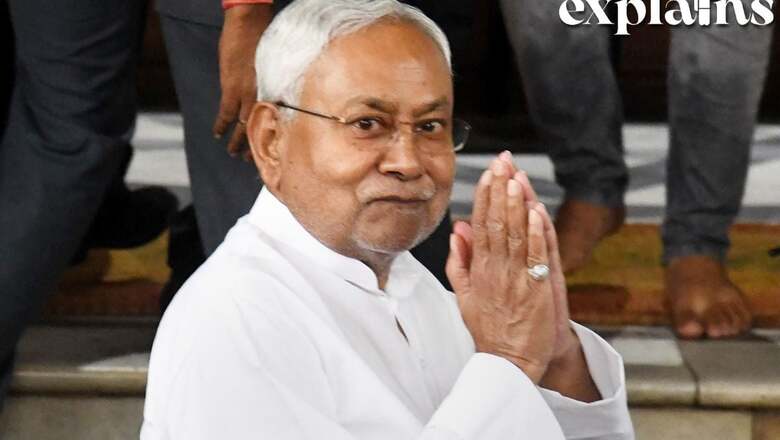
views
JD(U) President Nitish Kumar took oath as the chief minister of Bihar for a record ninth time. The longest serving chief minister of Bihar switched sides severing ties with RJD-led ‘Mahagathbandhan’ and staked claims to form a new government with the BJP, which he had dumped less than 18 months ago.
Nitish Kumar first took oath as the Chief Minister of Bihar in 2000. However, his government fell within a week. The JD(U) supremo has been the chief minister of the state ever since 2005 and continued to remain in the position except for a brief period in 2014.
Nitish’s Political Career
Nitish Kumar was born on March 1, 1951, in Bakhtiyarpur, a nondescript town on the outskirts of Patna, to an Ayurvedic practitioner-cum-freedom fighter father. He is an electrical engineer by training.
During his days at the Bihar Engineering College, now known as NIT, Patna, he became active in student politics and got associated with the “JP movement" which introduced him to many of his future associates, including Lalu Prasad and Sushil Kumar Modi who were then, respectively, president and general secretary of the Patna University Students’ Union.
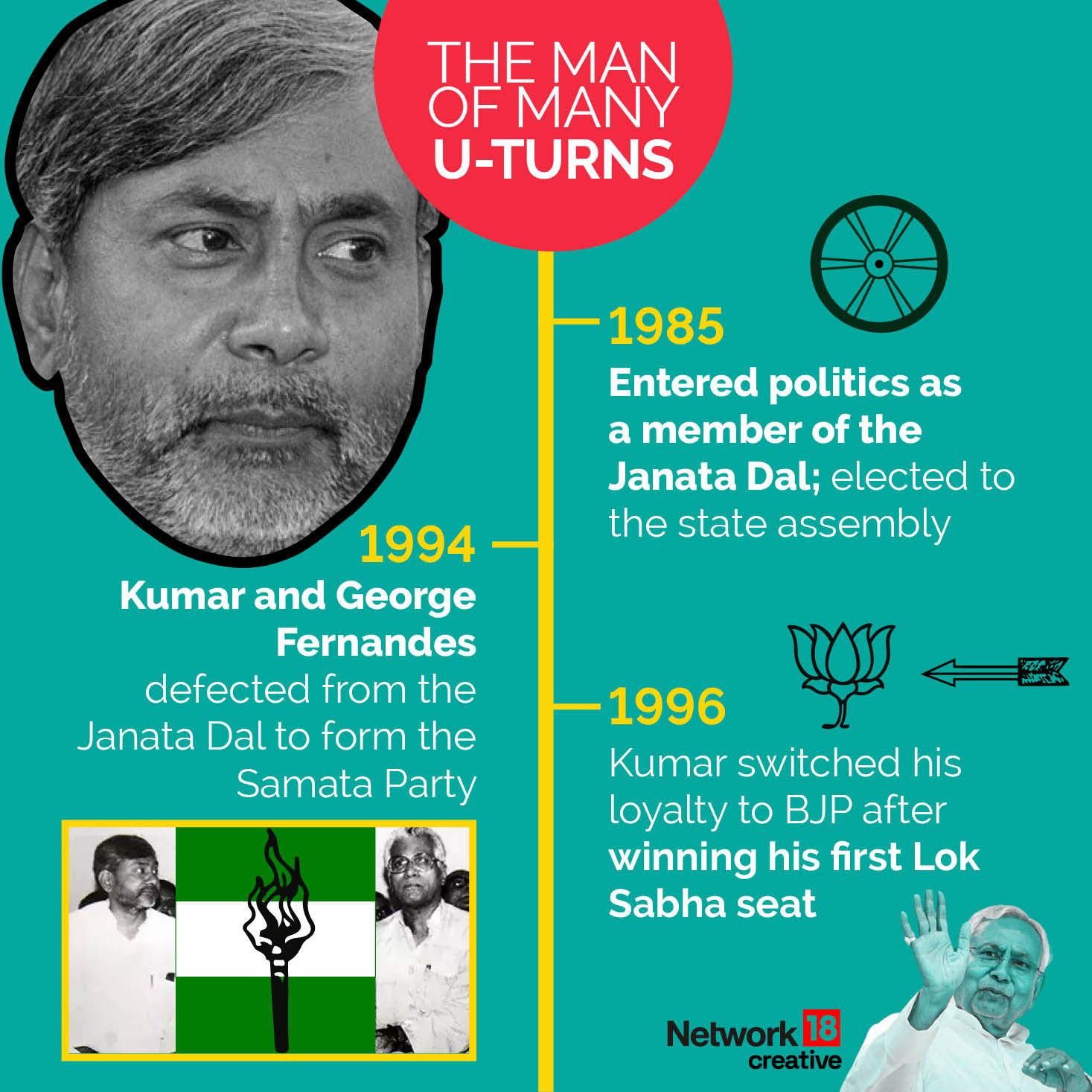
His first electoral success came in the 1985 assembly elections which the Congress swept though he managed to win the Harnaut seat for Lok Dal. Five years later in 1989, he moved to Delhi as an MP from the now-abolished seat of Barh.
After another half a decade, when the Mandal wave was at its peak and Prasad was reaping its dividends, Kumar sided with George Fernandes to float the Samata Party, which later morphed into the JD(U)) and share power with the BJP at the Centre and, from 2005 onwards, in the state.
Here’s a look at Nitish Kumar’s eight previous tenures as the Bihar CM:
First term: 2000
Nitish Kumar took oath as Bihar Chief Minister for the first time on March 3, 2000, after campaigning against foe-turned-ally-turned foe Lalu Prasad Yadav’s ‘Jungle-Raj’ and continued only for 7 days as he could not prove his majority.
Kumar’s party fell short of a majority as neither the Rashtriya Janata Dal (RJD) nor the NDA could cross the halfway mark in the assembly, Nitish resigned on March 10, 2000 even before the vote of confidence in the assembly.
Second term: 2005
Nitish Kumar won the 2005 Bihar Assembly elections for the second term in November 2005 with the support from the NDA. While Nitish’s JD(U) won 88 seats and BJP won 55 seats and sailed through the majority mark of 122 in 243-member House.
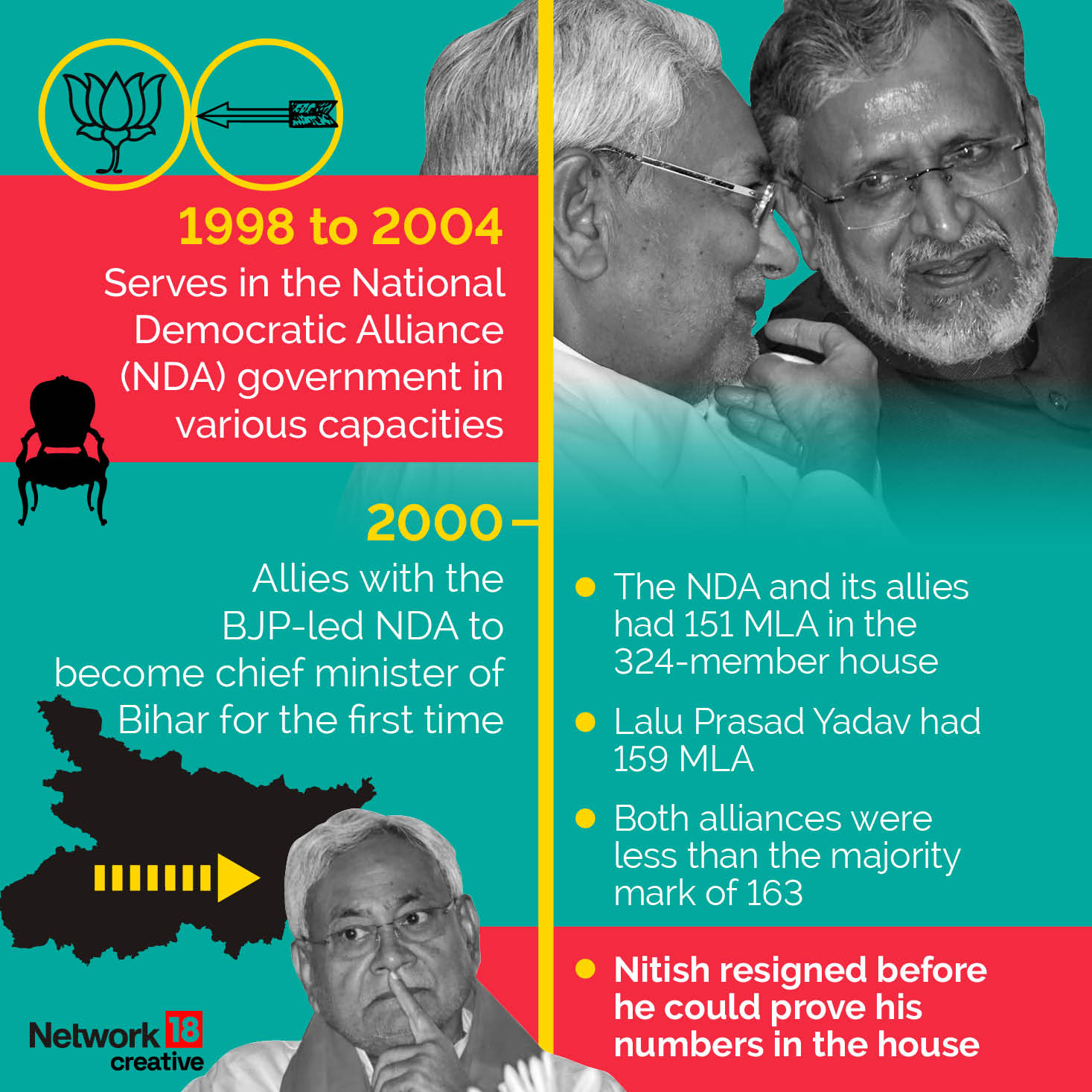
His first five years as Chief Minister are recalled with admiration even by critics, marked by vast improvements in the restoration of law and order in a state that made headlines for massacres by rivalling militias and kidnappings for ransom.
Third term: 2010
Nitish reclaimed power in 2010 alongside ally BJP and become chief minister once again. He was called ‘Susashan Babu’, a popular name Nitish earned for his developmental and able administration. He snapped 17-year-old alliance with the BJP in 2013 following the announcement of Narendra Modi as the BJP’s prime ministerial candidate and contested the 2014 Lok Sabha polls alone.
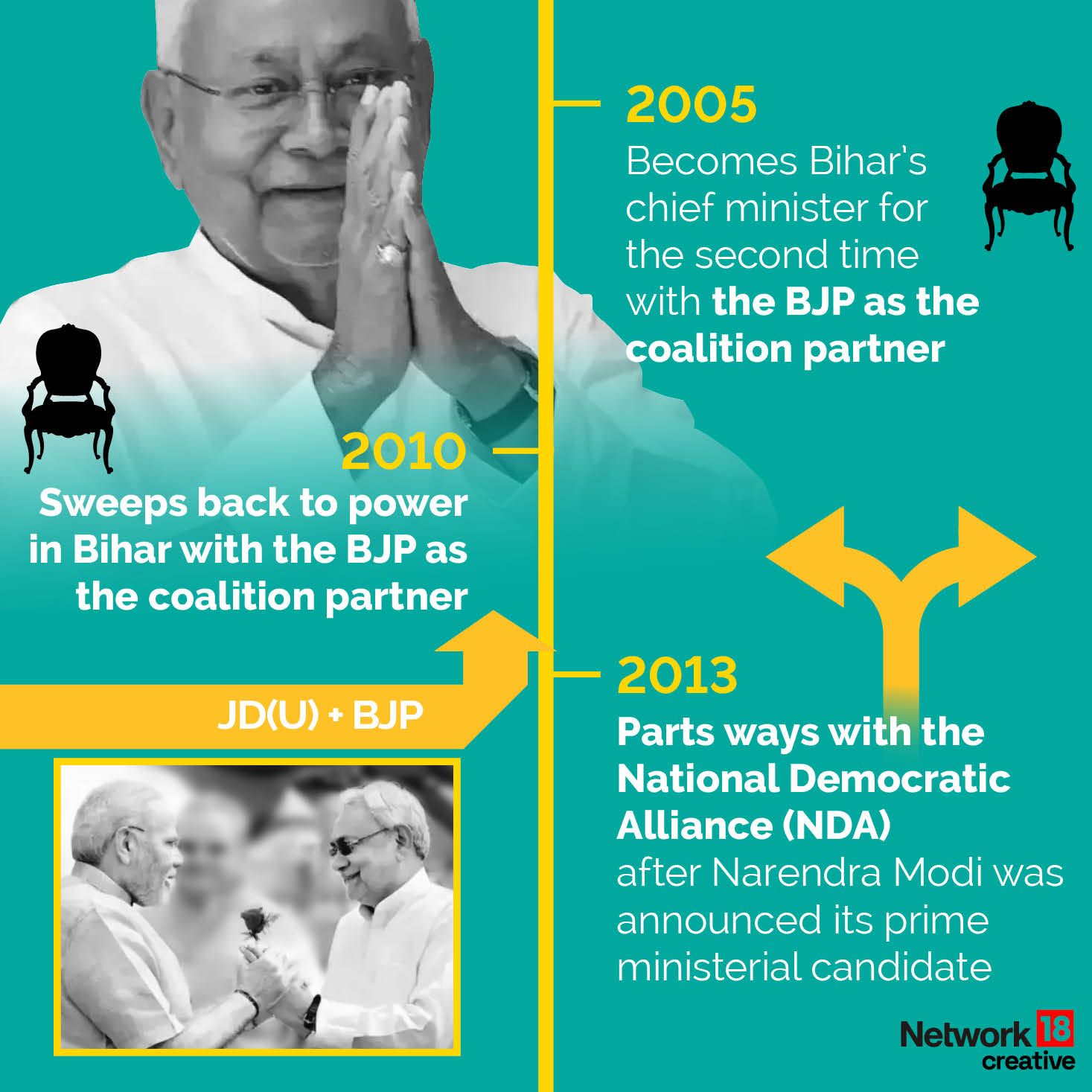
In May 2014, he submitted his resignation after a dismal performance by his party in the 2014 Lok Sabha elections. Nitish Kumar stepped aside taking moral responsibility allowing his party leader Jitan Ram Manjhi to take charge.
Manjhi’s 10-Month Rule
Jitan Ram Manjhi remained Bihar Chief Minister for a brief period of nearly ten months, from May 20, 2014, until February 21, 2015.
Fourth term: 2015
Nitish once against assumed the Chief Ministerial post in February, 2015 after Jitan Ram Manjhi’s resignation. His party JD(U) entered into alliance with the Mahagathbandhan, which included parties like RJD and Congress.
Fifth term: 2015
In the 2015 Assembly Elections, the Mahagathbandhan (Grand Alliance) won securing 178 seats in the 243-member House. Nitish Kumar was sworn in for the fifth time as the CM, while RJD supremo Lalu Yadav’s son Tejashwi Yadav became Deputy Chief Minister. However, two years later, he snapped ties with RJD and went into alliance with the BJP.
Sixth term: 2017
There was a pressure on the Mahagathbandhan government after corruption charges against Tejashwi Yadav, while the RJD reportedly refused to address the allegations. In 2017, he returned to the NDA, accusing the RJD of corruption and choking governance in the state, and broke ties with the RJD alliance and joined the NDA.
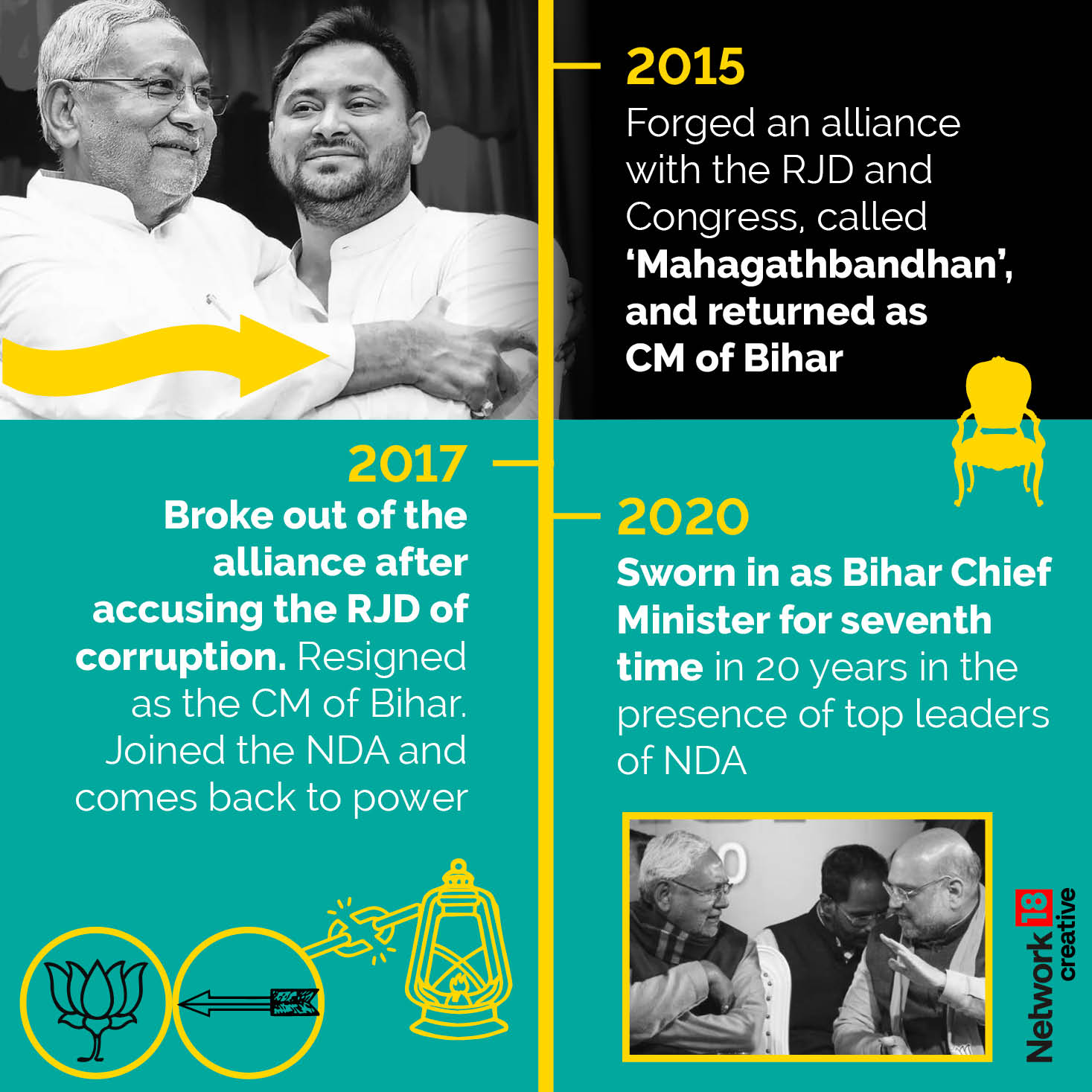
He again became the Chief Minister with NDA’s support and contested the 2019 Lok Sabha polls and 2020 Bihar Assembly elections as part of the BJP-led NDA alliance.
Seventh term: 2020
The NDA managed to cross the majority with 125 seats while RJD emerged as the single largest party. The JD(U) had 44 MLAs while the BJP 78. Nitish Kumar took oath as the CM for the seventh term on November 16, 2020.
Eighth term: 2022
However, he once again snapped ties with the BJP accusing it of trying to “split" his JD(U) and joined the Mahagathbandhan in August 2022. He formed a new government with a multi-party coalition that included RJD, Congress and three Left parties. He took the oath for the eighth time as CM in 2022 while Tejashwi became the Deputy CM.
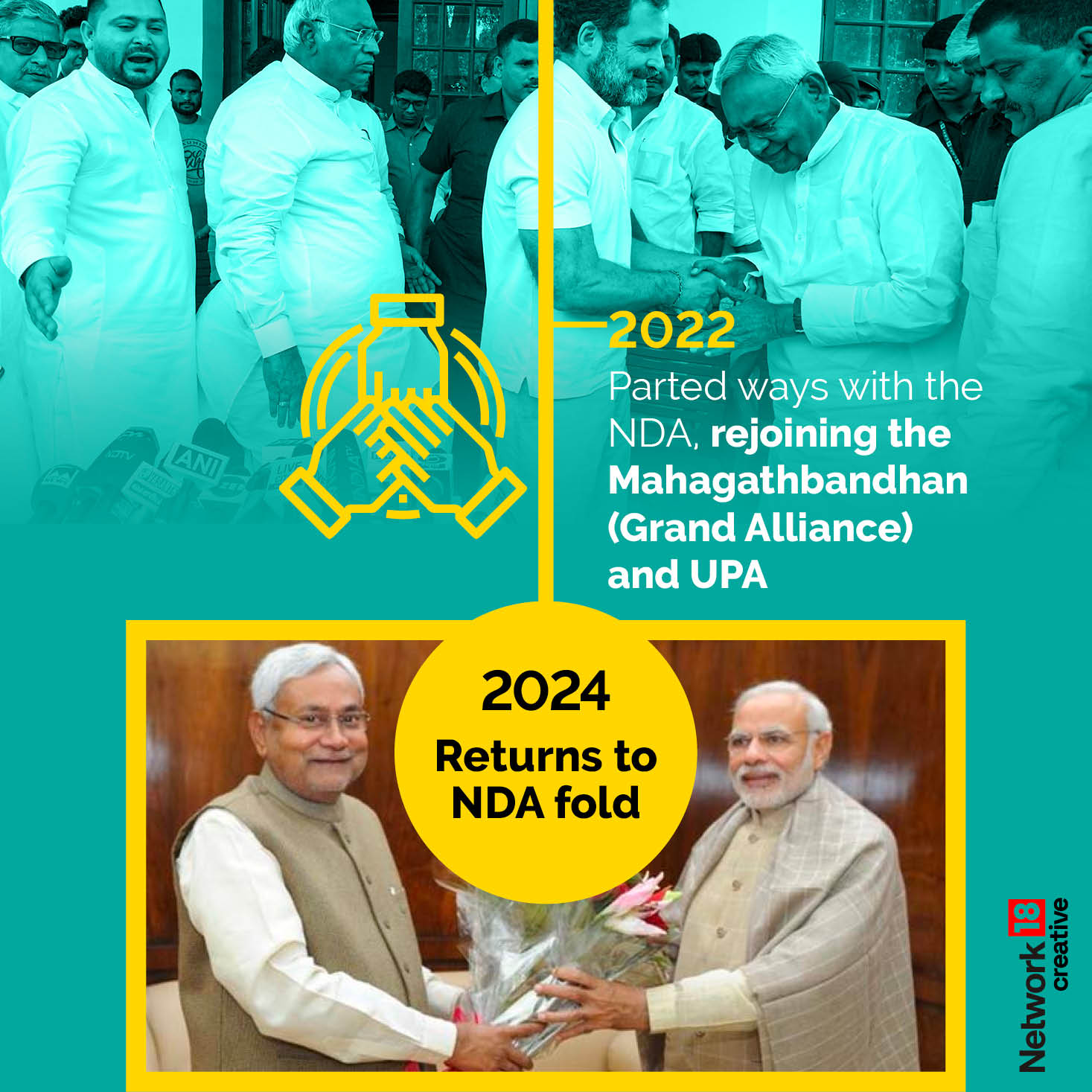
Ninth term: 2024
Nitish resigned as the Chief Minister of Bihar on Sunday saying “things were not working well" for him in the Mahagathbandhan and the opposition bloc INDIA and staked claim to form a new government with the BJP, which he had dumped less than 18 months ago.
Kumar took oath as Chief Minister for a record ninth time, and the third time since the 2020 assembly polls. The 72-year-old leader indicated that he was not feeling happy with the way things were in the Mahagathbandhan in the state as well as the INDIA bloc that he helped take shape but which failed to adequately recognise his efforts.




















Comments
0 comment